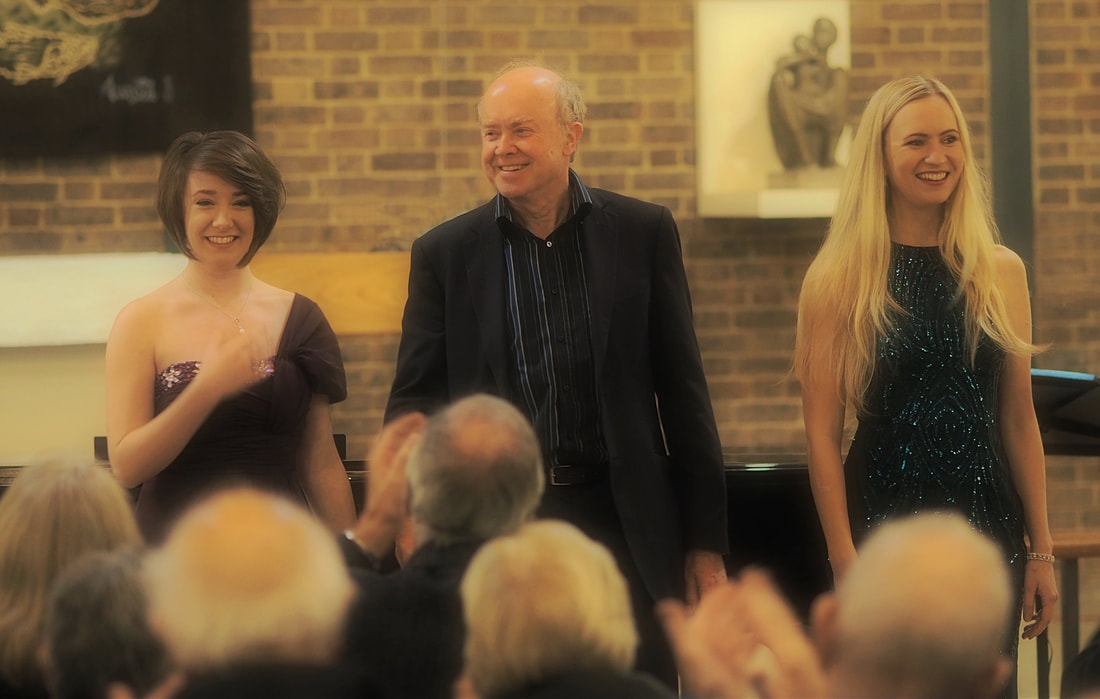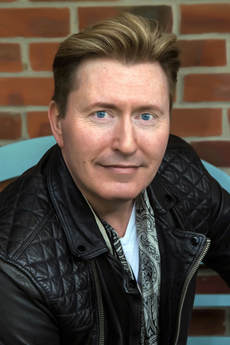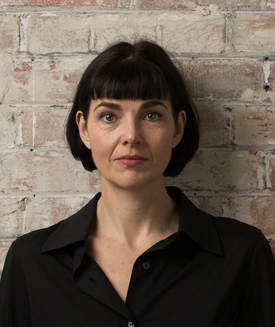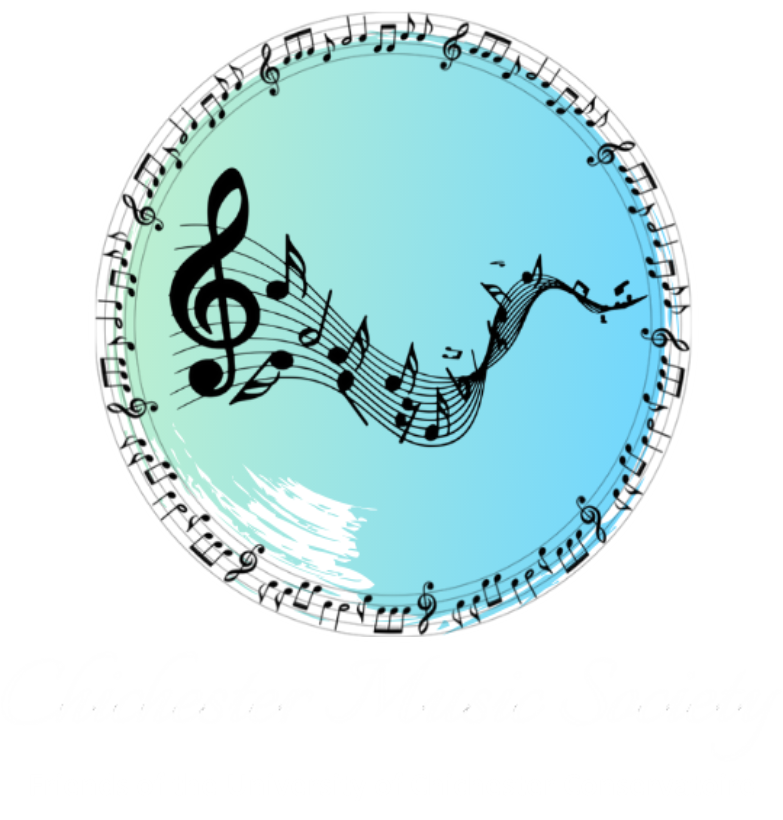The Funtington Music Group Christmas Special on 12 December took place at the University of Chichester. The Group welcomed back two former Chichester University graduates who were also previous Prize Winners of the Funtington Music Group’s prestigious Robert Headley Prize. Erin Alexander won in 2016 and Tina Gelnere in 2018. Both have gone on to pursue post-graduate careers at the Royal Welsh College of Music and Drama.
The two singers performed an amazingly varied programme that included works by 17 composers with a full 24 pieces in total. Chris Coote, in fact Treasurer of the Funtington Music Group, accompanied. His performance always did more than support, yet never overwhelmed or eclipsed the singing voice. A real partnership in action.
The programme opened with a performance of Mister Snow from Carousel by Rodgers and Hammerstein, sung by Erin Alexander. The two soloists then took it is turns and Tina Gelnere opened with Voi, che sapete from Mozart’s Marriage of Figaro.
Both singers have attractive voices and sang with a keen awareness of the nuances of the text. They both met the varied linguistic and stylistic challenges of this varied programme ranging from Handel to Mozart to Puccini, Verdi, Rachmaninoff, Bizet and Debussy and produced some outstanding musical gems. They were equally skilful in adding humour, vocal colour, and sometimes a touch of the ridiculous, to their interpretations, so that the audience quickly warmed to and appreciated their performance and choice of music.
One could not help but admire the wide range of musical genres that this programme demanded, and the challenges that this created for the performers. Both soloists in their own way understood the full range of emotions that these varied operatic pieces demanded, and they were most effective in producing a very satisfying performance.
Erin Alexander, in the second half, had chosen three French pieces, including Debussy’s Beau Soir, where she was particularly impressive and mellifluously expressive. Tina Gelhere had chosen to sing three songs from Rachmaninoff, which she sang with a combination of gracefulness and energy, and was particularly moving with her performance of When Silent Night Doth Hold Me. The duets which the singers chose were particularly well-received, especially Ah Guarda Sorella from Mozart’s Cosi fan Tutti.
Following an hilarious encore (the ‘Meow’ duet), Chris Hough, Chairman of the Funtington Music Group, said, “This was a wonderfully entertaining concert from two gifted singers. They are obviously going to have a very bright future!”
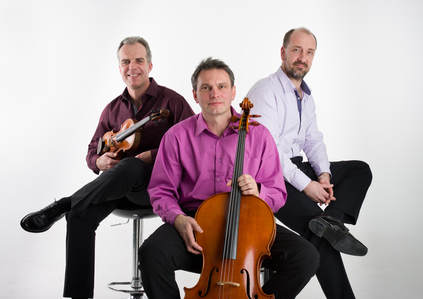
November
Trio Martinu
Pavel Safarik (Violin)
Jaroslav Matejka (Cello)
Petr Jirikovsky (Piano)
Trio Martinu
Pavel Safarik (Violin)
Jaroslav Matejka (Cello)
Petr Jirikovsky (Piano)
The Funtington Music Group welcomed the Trio Martinu on 14 November at the University of Chichester. The Trio have played together for nearly 30 years, and although originally from Prague, they have travelled internationally, playing all over the world.
The Trio’s first piece was well chosen, Bohuslav Martinu’s Piano Trio No 3 in C Major, H322. It immediately established, due to its musically technical demands, the calibre of the Trio. The three musicians proved capable of the highest order of ensemble playing, with an impressive and captivating performance. The varied character of the first movement was convincingly interpreted, and the adagio was played with yearning reflectivity. The finale was particularly memorable.
The second piece was Mendelssohn’s Piano Trio No 1 in D Minor Opus 49. This enormously demanding work allowed the Trio to demonstrate each soloist’s individual technical brilliance, as well as their mutual co-ordination as an ensemble. Jaroslav Matejka’s exquisite cello tones and deeply musical phrasing was a pleasure to listen to, and Pavel Safarik’s violin brought a splendid interpretation and vibrancy to the melody. The pianist, Petr Jirikovsky, throughout communicated a wonderful appreciation of Mendelssohn’s breadth and diversity, which held the Trio together. The finale was spell-binding and left the audience thoroughly enthusiastic and entertained.
After the interval the Trio played Dvorak’s Piano Trio No 3 in F Minor Opus 65. This work was written after the composer’s mother and child had died and often reflects his deep felt sorrow. The Trio Martinu successfully communicated this dichotomy, reflecting the composer’s diverse emotional palette, balancing light with dark, gravity with mischief. Indeed after the melancholic third movement, the Trio ended the contrasting more joyful final allegro with a remarkable passionate and effective performance.
Chris Hough, Chairman of the Funtington Music Group, said, “Superlative performances by the Trio Martinu, thrilling! We were delighted to be offered an encore and the audience showed their genuine appreciation with much applause. This was an evening to remember.”
Members of the Funtington Music Group were treated on 10 October at the University of Chichester to a fascinating behind the scenes lecture recital by Paul Turner [piano], and Clare McCaldin [mezzo-soprano], on the “Art of the Accompanist - Working towards a Perfect Performance.”
Paul Turner, who has worked with many eminent musicians throughout the world, began by correcting common misconceptions about the art of the accompanists, preferring the view of two artists working together rather than the accompanist simply supporting the solo artist. He explained that trust is vital between the two musicians and that it is necessary for the accompanist to have real empathy with the soloist, and be ready to adjust, say, his emphasis of musical phrasing or speed of playing. He pointed out that he had worked with Clare McCaldin for a number of years, and so they both had built up that vital “trust” in each other. The two artists then spent the first half giving examples from the programme that was to follow, the pitfalls that could occur and on one occasion he had Clare and the audience in fits of laughter after one classic musical fiasco. It gave the audience a fascinating insight into the preparation that was necessary for the music that was to follow after the interval.
After an introductory rather joyful Sailor’s Song, by Haydn, Clare McCaldin sang a selection of songs by Faure, including Mandoline and Les Berceaux. Her performance of these French songs created appropriate atmospheric emotions, and her diction and phrasing were a real asset to this performance. She then moved effortlessly from French to German, with an effective performance of four of the challenging Mignon Lieder Songs by Hugo Wolf. She demonstrated great and varied musical expression in her beautiful interpretation of this really demanding work.
The concert concluded with a selection of songs that included works by Vaughan Williams and Gurney, concluding with a late 20th Century piece by Geoffrey Bush. Clare McCalden delivered her songs with sensitivity and variety, employing a palette of vocal skills that produced a first class performance. Paul Turner’s accompaniment was throughout discrete and supportive, always drawing attention to the music and detail of the singing unobtrusively and effectively.
Chris Hough, Chairman of Funtington Music Group, said, “This was a memorable evening with two outstanding musicians. Paul Turner’s sensitive approach together with Clare McCalden’s expressive performance, demonstrated the true skills of an excellent accompanist. My thanks go to both Paul and Clare”
Paul Turner, who has worked with many eminent musicians throughout the world, began by correcting common misconceptions about the art of the accompanists, preferring the view of two artists working together rather than the accompanist simply supporting the solo artist. He explained that trust is vital between the two musicians and that it is necessary for the accompanist to have real empathy with the soloist, and be ready to adjust, say, his emphasis of musical phrasing or speed of playing. He pointed out that he had worked with Clare McCaldin for a number of years, and so they both had built up that vital “trust” in each other. The two artists then spent the first half giving examples from the programme that was to follow, the pitfalls that could occur and on one occasion he had Clare and the audience in fits of laughter after one classic musical fiasco. It gave the audience a fascinating insight into the preparation that was necessary for the music that was to follow after the interval.
After an introductory rather joyful Sailor’s Song, by Haydn, Clare McCaldin sang a selection of songs by Faure, including Mandoline and Les Berceaux. Her performance of these French songs created appropriate atmospheric emotions, and her diction and phrasing were a real asset to this performance. She then moved effortlessly from French to German, with an effective performance of four of the challenging Mignon Lieder Songs by Hugo Wolf. She demonstrated great and varied musical expression in her beautiful interpretation of this really demanding work.
The concert concluded with a selection of songs that included works by Vaughan Williams and Gurney, concluding with a late 20th Century piece by Geoffrey Bush. Clare McCalden delivered her songs with sensitivity and variety, employing a palette of vocal skills that produced a first class performance. Paul Turner’s accompaniment was throughout discrete and supportive, always drawing attention to the music and detail of the singing unobtrusively and effectively.
Chris Hough, Chairman of Funtington Music Group, said, “This was a memorable evening with two outstanding musicians. Paul Turner’s sensitive approach together with Clare McCalden’s expressive performance, demonstrated the true skills of an excellent accompanist. My thanks go to both Paul and Clare”
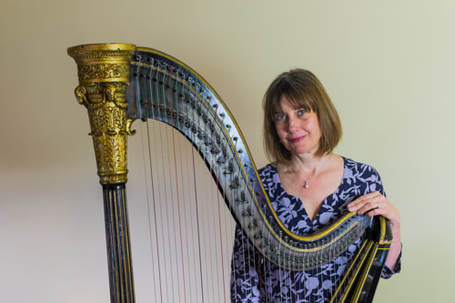
September
Frances Kelly
The History of the Harp
The Funtington Music Group opened its Autumn Season on 12 September at the University of Chichester with internationally renowned Harpist Frances Kelly giving a fascinating lecture recital on the History of the Harp.
Frances Kelly’s beautiful introductory piece was La Source, written by Alfonse Hasselmans, a significant French musician, who had done so much to encourage the development of the harp as a popular musical instrument. In her performance, Frances evocatively created the traditional sound of the harp, of running, bubbly water, a sound which was both timeless and magical. She then went on to show how diverse and subtle was the span of historical development for the harp from its prehistoric beginnings up to the present day, next creating sounds reminiscent of Tudor England on her Medieval Harp.
Turning then to the Spanish Harp, she played a copy of a harp first built in 1615. The sound had now become fuller and richer, and was not too dissimilar to the Italian Harp of the same period which followed. She noted that these instruments suited the music of the time, music that was played both at court and at church.
The first half ended with Frances Kelly turning to the Wire-strung Harp, which was popular at the time in Ireland and Scotland. Her rendition of Turlough O’Carolan’s Welcome, and Concerto was an example of her impressive ability to blend and colour the music and in this case to create the atmospheric mystery of Ireland.
She then went on to play on the Welsh Triple Harp [still popular in Wales today] pieces from Concerto No 4 and Saul by Handel, before choosing the Single Action Pedal Harp, which became standardised in the 1720s.
Finally she moved to the Double Action Pedal Harp which is in current use everywhere. She noted that it was patented in the early 19th Century and it had not really changed since then. The two pieces she chose to play on this instrument were in complete contrast to each other. Chanson dans la Nuit, by Carlos Salzado, brought us right into the mid-20th Century, but she ended the concert with a delightful performance of Impromptu by Faure.
Frances Kelly is an accomplished lecturer as well as an impressive musician. She sees beyond the notes and creates instinctively, and apparently effortlessly, what the composer had in mind. As Chris Hough, Chairman of the Funtington Music Group, said, “This was a very special concert. Frances Kelly showed fine musicianship and gave us so many insights into the music for the harp. It was wonderful to hear so many different instruments!”
Frances Kelly
The History of the Harp
The Funtington Music Group opened its Autumn Season on 12 September at the University of Chichester with internationally renowned Harpist Frances Kelly giving a fascinating lecture recital on the History of the Harp.
Frances Kelly’s beautiful introductory piece was La Source, written by Alfonse Hasselmans, a significant French musician, who had done so much to encourage the development of the harp as a popular musical instrument. In her performance, Frances evocatively created the traditional sound of the harp, of running, bubbly water, a sound which was both timeless and magical. She then went on to show how diverse and subtle was the span of historical development for the harp from its prehistoric beginnings up to the present day, next creating sounds reminiscent of Tudor England on her Medieval Harp.
Turning then to the Spanish Harp, she played a copy of a harp first built in 1615. The sound had now become fuller and richer, and was not too dissimilar to the Italian Harp of the same period which followed. She noted that these instruments suited the music of the time, music that was played both at court and at church.
The first half ended with Frances Kelly turning to the Wire-strung Harp, which was popular at the time in Ireland and Scotland. Her rendition of Turlough O’Carolan’s Welcome, and Concerto was an example of her impressive ability to blend and colour the music and in this case to create the atmospheric mystery of Ireland.
She then went on to play on the Welsh Triple Harp [still popular in Wales today] pieces from Concerto No 4 and Saul by Handel, before choosing the Single Action Pedal Harp, which became standardised in the 1720s.
Finally she moved to the Double Action Pedal Harp which is in current use everywhere. She noted that it was patented in the early 19th Century and it had not really changed since then. The two pieces she chose to play on this instrument were in complete contrast to each other. Chanson dans la Nuit, by Carlos Salzado, brought us right into the mid-20th Century, but she ended the concert with a delightful performance of Impromptu by Faure.
Frances Kelly is an accomplished lecturer as well as an impressive musician. She sees beyond the notes and creates instinctively, and apparently effortlessly, what the composer had in mind. As Chris Hough, Chairman of the Funtington Music Group, said, “This was a very special concert. Frances Kelly showed fine musicianship and gave us so many insights into the music for the harp. It was wonderful to hear so many different instruments!”
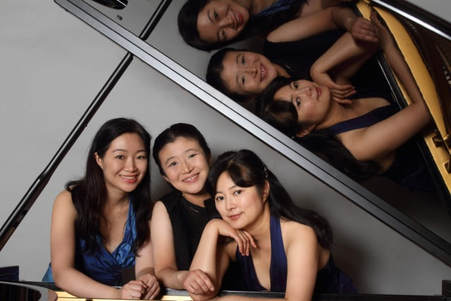
June
Annual Summer Concert
Fujita Piano Trio
The Funtington Music Group’s 26th Annual Summer Concert took place at the University of Chichester on 13 June. The Fujita Piano Trio, consisting of three sisters from Japan, played a delightful programme to a packed and appreciative audience.
Haydn’s Piano Trio in C Major XV: 27, which opened the concert, quickly established the group’s musical strengths. The piece boasts a sparkling piano part, and Megumi Fujita [piano] with generous virtuosity, encouraged spirited interplay between the strings and the pianist, which meant that the impetus of the music never wavered. This was an excellent start to the evening, and was very much appreciated by the audience, who quickly realised that they were in for a real treat.
From the very first notes of the next piece, the Trio emphasised the romantic elegance and lyricism of Mendelssohn’s Piano Trio No 1 in D Minor Opus 49. The three musicians played this not only with an immediate and exploding passion, but also with a technically impeccable interpretation. The perfectly attuned Trio achieved a beguiling mix of delicacy and virtuosity, with a beautifully integrated sound both from the violin of Arisa Fujita, and the cello of Honoka Fujita.
During the interval, the audience was treated to a luscious buffet of salmon, cold meats and salad, followed by strawberries and cream, and other delicacies. This was washed down with either Prosecco or wine. The buffet was all organised by Adrienne Barnett, who, when thanked by the Chairman was given a really appreciative round of applause!
The final piece was an extremely enjoyable performance of Schubert’s Piano Trio No 2 in Eb Major D929. This is a demanding piece, lyrical at times, virtuosic at others, which demands a high level of interpretive skill. The Trio played with a warmth of expression and produced an outstandingly successful musical interpretation.
Chris Hough, Chairman of the Funtington Music Group, said,” Our concert tonight was an absolute delight. The Fujita have given us wonderful performances of wonderful music!”
Annual Summer Concert
Fujita Piano Trio
The Funtington Music Group’s 26th Annual Summer Concert took place at the University of Chichester on 13 June. The Fujita Piano Trio, consisting of three sisters from Japan, played a delightful programme to a packed and appreciative audience.
Haydn’s Piano Trio in C Major XV: 27, which opened the concert, quickly established the group’s musical strengths. The piece boasts a sparkling piano part, and Megumi Fujita [piano] with generous virtuosity, encouraged spirited interplay between the strings and the pianist, which meant that the impetus of the music never wavered. This was an excellent start to the evening, and was very much appreciated by the audience, who quickly realised that they were in for a real treat.
From the very first notes of the next piece, the Trio emphasised the romantic elegance and lyricism of Mendelssohn’s Piano Trio No 1 in D Minor Opus 49. The three musicians played this not only with an immediate and exploding passion, but also with a technically impeccable interpretation. The perfectly attuned Trio achieved a beguiling mix of delicacy and virtuosity, with a beautifully integrated sound both from the violin of Arisa Fujita, and the cello of Honoka Fujita.
During the interval, the audience was treated to a luscious buffet of salmon, cold meats and salad, followed by strawberries and cream, and other delicacies. This was washed down with either Prosecco or wine. The buffet was all organised by Adrienne Barnett, who, when thanked by the Chairman was given a really appreciative round of applause!
The final piece was an extremely enjoyable performance of Schubert’s Piano Trio No 2 in Eb Major D929. This is a demanding piece, lyrical at times, virtuosic at others, which demands a high level of interpretive skill. The Trio played with a warmth of expression and produced an outstandingly successful musical interpretation.
Chris Hough, Chairman of the Funtington Music Group, said,” Our concert tonight was an absolute delight. The Fujita have given us wonderful performances of wonderful music!”
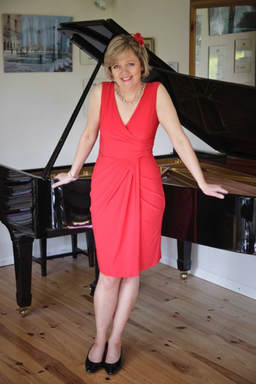
May
The Music of Fanny Mendelssohn
Angela Zanders
The Funtington Music Group was introduced to the Music of Fanny Mendelssohn on 9 May at the University of Chichester. Angela Zanders talked about her life, her marriage to Wilhelm Hensel, and her relationship with her brother Felix, within the context of the piano piece Das Jahr [The Year]. This is a cycle of 13 character pieces for each month of the year with an Epilogue, which Angela played in full.
This approach was outstandingly effective as a lecture recital, and Angela Zanders gave the audience a fascinating insight into a composer who is so little known. Very few of her 460 works for instance have been published. The sub-title of Angela’s presentation was “Forgotten Genius” and this seems very much to have been the case, probably as Fanny was a woman in an early 18th Century man’s world. She did publish some of her works, but often under the name of Felix, her brother.
The piece chosen for this concert, Das Jahr, was very appropriate, as it shows Fanny’s musical talent as a composer extremely well. It was written just after her return from Italy, and unfortunately just before she died in 1842, aged only 42.
There is such variety in the music, from the unaffected lyricism, of say the month of May, to the crisp and exciting concluding months of November and December. Angela Zanders’ performance was full of delightful details, played with a sense of flow, often intimate in detail, allowing the music to speak with its own sense of originality.
At times there is the need for intricate virtuosity, particularly in the month of August. In other months, such as July, the music demands a complete contrast in tone and texture. Indeed, the music appears brooding, atmospheric and sometimes quite disillusioned. Angela ably moved from mood to mood, transitioning with unaffected confidence and effectiveness.
This piece is not well-known, but it was definitely worthwhile having Angela Zanders explore, explain and perform Fanny Mendelssohn’s Das Jahr. She deservedly earned the enthusiastic applause of the audience.
Chris Hough, Chairman of the Funtington Music Group, said, “thank you Angela for so effectively bringing to life for us, this wonderful piece of music from such a neglected composer. Your consummate playing and insightful lecture were outstanding!”
The Music of Fanny Mendelssohn
Angela Zanders
The Funtington Music Group was introduced to the Music of Fanny Mendelssohn on 9 May at the University of Chichester. Angela Zanders talked about her life, her marriage to Wilhelm Hensel, and her relationship with her brother Felix, within the context of the piano piece Das Jahr [The Year]. This is a cycle of 13 character pieces for each month of the year with an Epilogue, which Angela played in full.
This approach was outstandingly effective as a lecture recital, and Angela Zanders gave the audience a fascinating insight into a composer who is so little known. Very few of her 460 works for instance have been published. The sub-title of Angela’s presentation was “Forgotten Genius” and this seems very much to have been the case, probably as Fanny was a woman in an early 18th Century man’s world. She did publish some of her works, but often under the name of Felix, her brother.
The piece chosen for this concert, Das Jahr, was very appropriate, as it shows Fanny’s musical talent as a composer extremely well. It was written just after her return from Italy, and unfortunately just before she died in 1842, aged only 42.
There is such variety in the music, from the unaffected lyricism, of say the month of May, to the crisp and exciting concluding months of November and December. Angela Zanders’ performance was full of delightful details, played with a sense of flow, often intimate in detail, allowing the music to speak with its own sense of originality.
At times there is the need for intricate virtuosity, particularly in the month of August. In other months, such as July, the music demands a complete contrast in tone and texture. Indeed, the music appears brooding, atmospheric and sometimes quite disillusioned. Angela ably moved from mood to mood, transitioning with unaffected confidence and effectiveness.
This piece is not well-known, but it was definitely worthwhile having Angela Zanders explore, explain and perform Fanny Mendelssohn’s Das Jahr. She deservedly earned the enthusiastic applause of the audience.
Chris Hough, Chairman of the Funtington Music Group, said, “thank you Angela for so effectively bringing to life for us, this wonderful piece of music from such a neglected composer. Your consummate playing and insightful lecture were outstanding!”
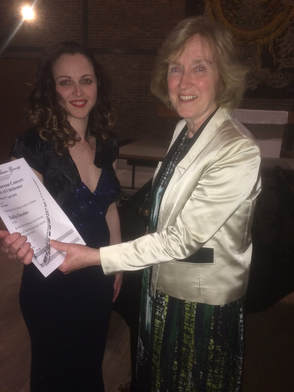
April
Student Showcase Review
The fifteenth annual University Showcase competition on 18th April was once again a most memorable evening when we heard six student performances competing for The Robert Headley Music Prize. They were chosen from the original sixteen that auditioned, and the competition was adjudicated by Lisa Smith, Head of Creative and Performing Arts at Chichester College.
Winner of the first prize of £600, violist Yuliya Knowles from the Ukraine, entranced us with her beautiful tone as she performed pieces by Wieniawski and Bruch and we were hanging on her every note as her totally committed emotions came through. She was ably accompanied by Ben Hall, Head of Music at the University.
The second prize of £350 went to soprano Charlotte Roberts, accompanied by Craig Thomas. She sang arias and songs by Mozart, Vaughan Williams, Carlisle Floyd, and Poulenc. Her singing of Poulenc’s ‘Hotel’ was particularly singled out as ‘smoky’.
Third prize of £250 went to pianist Beth Gallimore who played preludes by Rachmaninoff and Argentinian dances by Ginastera. Her playing of these technically demanding pieces was stylish and very accurate.
There were three runners up prizes of £100 each. The Ted Riley Trumpet Trio played a fascinating series of short pieces by twentieth century composers and impressed us with their impressive ensemble playing particularly as they stood some distance apart to enhance the antiphonal effect. Violinist Ion Tverdohlieb from Moldova, accompanied by Simon Arthurs, played a delightful Poem by Chausson, and soprano Bryony Morison accompanied by Michael Winter sang songs by Bellini, Weber, Faure, Quilter and Korngold in no fewer than four languages, demonstrating a dreamy quality and an ease of tonal variation.
The prizes were awarded by the University’s Vice-Chancellor, Professor Jane Longmore, who expressed her pleasure at the very high standard of musicianship on display, and the excellent relationship that the Funtington Music Group has forged with the University’s Music Department.
Student Showcase Review
The fifteenth annual University Showcase competition on 18th April was once again a most memorable evening when we heard six student performances competing for The Robert Headley Music Prize. They were chosen from the original sixteen that auditioned, and the competition was adjudicated by Lisa Smith, Head of Creative and Performing Arts at Chichester College.
Winner of the first prize of £600, violist Yuliya Knowles from the Ukraine, entranced us with her beautiful tone as she performed pieces by Wieniawski and Bruch and we were hanging on her every note as her totally committed emotions came through. She was ably accompanied by Ben Hall, Head of Music at the University.
The second prize of £350 went to soprano Charlotte Roberts, accompanied by Craig Thomas. She sang arias and songs by Mozart, Vaughan Williams, Carlisle Floyd, and Poulenc. Her singing of Poulenc’s ‘Hotel’ was particularly singled out as ‘smoky’.
Third prize of £250 went to pianist Beth Gallimore who played preludes by Rachmaninoff and Argentinian dances by Ginastera. Her playing of these technically demanding pieces was stylish and very accurate.
There were three runners up prizes of £100 each. The Ted Riley Trumpet Trio played a fascinating series of short pieces by twentieth century composers and impressed us with their impressive ensemble playing particularly as they stood some distance apart to enhance the antiphonal effect. Violinist Ion Tverdohlieb from Moldova, accompanied by Simon Arthurs, played a delightful Poem by Chausson, and soprano Bryony Morison accompanied by Michael Winter sang songs by Bellini, Weber, Faure, Quilter and Korngold in no fewer than four languages, demonstrating a dreamy quality and an ease of tonal variation.
The prizes were awarded by the University’s Vice-Chancellor, Professor Jane Longmore, who expressed her pleasure at the very high standard of musicianship on display, and the excellent relationship that the Funtington Music Group has forged with the University’s Music Department.
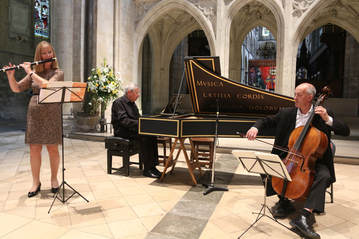
March
Elizabeth Walker (flute) with Ensemble Continuum
Members of the Funtington Music Group on 14 March at the University of Chichester were entertained to a rare change of style when the Group welcomed The Baroque Trio, Continuum, led by Elizabeth Walker [flute]. The evening’s programme was well designed to show the Development of the Baroque Trio. Elizabeth Walker, playing the Baroque Flute, produced throughout the concert a variety of warm, delicate sounds. She is an assertive interpreter, coaxing out melodies, and imposing overall shape to the music.
The second piece, J P Rameau’s Cinquieme Concert from Piece de Clavecin, was a delight, with a vigorous performance, with plenty of dynamic contrasts, emphasising the Trio’s virtuosic abilities. The Baroque musical sounds may have been delicate, but the Trio ably rejuvenated the world of the Baroque, which the audience much appreciated.
Their third piece, Il Pastor Fido, Sonata No 4 in A Major, was interesting in that the composer, originally thought to be Vivaldi, is now believed to be Chedeville. The sounds created produced a lighter shade of Vivaldi’s musical textures, yet this was still an enjoyable piece in its own right. The Trio were sensitively effective in the Pastorale. The final Allegro ended, in contrast, with an energetically flamboyant conclusion.
The second half focused on the trio sonata and included music by Telemann, and a section of the Sonata in G Major by C P E Bach. The players beautifully reflected each instrument’s character, and the accompaniment by Michael Overbury on the Harpsichord was an excellent example of understated musical talent, producing such a rich and warm sound.
The Cello Sonata Opus 5 by Lanzetti showcased so well the playing of Sebastian Comberti, who brought out the “modern feel” of the music, with its galloping chords.
Under the direction of Elizabeth Walker, the Trio performed with obvious enjoyment and each was able to portray their own characters during the evening. The acoustic of the University Chapel also served the Baroque music well, and the artistry of the Trio was outstanding, with each instrumental voice emerging in clear context. Their final piece Flute Sonata in E Minor 1717/23 was well chosen, and demonstrated, how skilled, entertaining, and professional an ensemble is Continuum.
Chris Hough, newly elected Chairman of the Funtington Music Group, said, “This was a consummate performance by three musicians at the top of their profession. We have had a memorable evening of Baroque music, played by an outstanding Trio.”
Elizabeth Walker (flute) with Ensemble Continuum
Members of the Funtington Music Group on 14 March at the University of Chichester were entertained to a rare change of style when the Group welcomed The Baroque Trio, Continuum, led by Elizabeth Walker [flute]. The evening’s programme was well designed to show the Development of the Baroque Trio. Elizabeth Walker, playing the Baroque Flute, produced throughout the concert a variety of warm, delicate sounds. She is an assertive interpreter, coaxing out melodies, and imposing overall shape to the music.
The second piece, J P Rameau’s Cinquieme Concert from Piece de Clavecin, was a delight, with a vigorous performance, with plenty of dynamic contrasts, emphasising the Trio’s virtuosic abilities. The Baroque musical sounds may have been delicate, but the Trio ably rejuvenated the world of the Baroque, which the audience much appreciated.
Their third piece, Il Pastor Fido, Sonata No 4 in A Major, was interesting in that the composer, originally thought to be Vivaldi, is now believed to be Chedeville. The sounds created produced a lighter shade of Vivaldi’s musical textures, yet this was still an enjoyable piece in its own right. The Trio were sensitively effective in the Pastorale. The final Allegro ended, in contrast, with an energetically flamboyant conclusion.
The second half focused on the trio sonata and included music by Telemann, and a section of the Sonata in G Major by C P E Bach. The players beautifully reflected each instrument’s character, and the accompaniment by Michael Overbury on the Harpsichord was an excellent example of understated musical talent, producing such a rich and warm sound.
The Cello Sonata Opus 5 by Lanzetti showcased so well the playing of Sebastian Comberti, who brought out the “modern feel” of the music, with its galloping chords.
Under the direction of Elizabeth Walker, the Trio performed with obvious enjoyment and each was able to portray their own characters during the evening. The acoustic of the University Chapel also served the Baroque music well, and the artistry of the Trio was outstanding, with each instrumental voice emerging in clear context. Their final piece Flute Sonata in E Minor 1717/23 was well chosen, and demonstrated, how skilled, entertaining, and professional an ensemble is Continuum.
Chris Hough, newly elected Chairman of the Funtington Music Group, said, “This was a consummate performance by three musicians at the top of their profession. We have had a memorable evening of Baroque music, played by an outstanding Trio.”
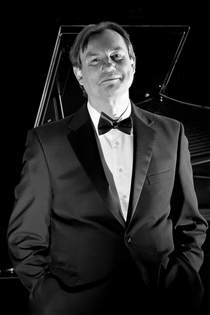
February
Peter Medhurst My World of Opera with Jeremy Limb (piano)
Peter Medhurst made a welcome return to Funtington Music Group at their February meeting, sharing and delighting his audience with a very personal view of his World of Opera. It proved to be a most interesting and amusing evening!
It soon became clear that a key influence on Peter had been Handel: “A hugely impacting” composer. Handel’s songs, organ and keyboard works had continued to astonish and delight him. Handel himself was an amazing performer and not, it seemed, averse to seeing off any competitors! We had an opportunity to enjoy arias, sung by Peter, from two of Handel’s operas.
Peter then went on to describe the development of the Venetian style that had so influenced Handel. He also stressed the importance of characterisation introduced by Monteverdi. This had given much greater depth to individual roles in each opera and to our understanding of their motivation and behaviour. Peter gave us some wonderful examples, a spirited one from from Purcell bringing first half to a close.
The second half of the evening began with one of Peter Medhurst’s latest discoveries, a very humorous piece by the American composer, Charles Ives. Wagner, and especially The Ring operatic cycle, was clearly another significant influence on Peter. It appeared that Faure and Messager had been present at the first performance of the Ring in Bayreuth and prepared a Souveniers de Bayreuth, a rather dubious piano duet of “all the best tunes”, played with great conviction by Peter and Jeremy!
Mozart “who lived and breathed opera” brought us towards the close of an excellent evening but it was A S Sullivan who Peter had discovered as a schoolboy who had the final word, appropriately enough, with The Nightmare Song from Iolanthe.
Jeremy Limb was a very able accompanist over a very wide range of music and performed a number of solo piano pieces. Particularly interesting and evocative was Ronald Stevenson’s Peter Grimes Fantasy, which had many of the brooding, threatening characteristics of Britten’s wonderful opera.
David Tinsley, the outgoing Chairman of Funtington Music Group, said that the evening had been “quite remarkable, a wonderful demonstration of erudition, skill and knowledge, from both artists”.
Peter Medhurst My World of Opera with Jeremy Limb (piano)
Peter Medhurst made a welcome return to Funtington Music Group at their February meeting, sharing and delighting his audience with a very personal view of his World of Opera. It proved to be a most interesting and amusing evening!
It soon became clear that a key influence on Peter had been Handel: “A hugely impacting” composer. Handel’s songs, organ and keyboard works had continued to astonish and delight him. Handel himself was an amazing performer and not, it seemed, averse to seeing off any competitors! We had an opportunity to enjoy arias, sung by Peter, from two of Handel’s operas.
Peter then went on to describe the development of the Venetian style that had so influenced Handel. He also stressed the importance of characterisation introduced by Monteverdi. This had given much greater depth to individual roles in each opera and to our understanding of their motivation and behaviour. Peter gave us some wonderful examples, a spirited one from from Purcell bringing first half to a close.
The second half of the evening began with one of Peter Medhurst’s latest discoveries, a very humorous piece by the American composer, Charles Ives. Wagner, and especially The Ring operatic cycle, was clearly another significant influence on Peter. It appeared that Faure and Messager had been present at the first performance of the Ring in Bayreuth and prepared a Souveniers de Bayreuth, a rather dubious piano duet of “all the best tunes”, played with great conviction by Peter and Jeremy!
Mozart “who lived and breathed opera” brought us towards the close of an excellent evening but it was A S Sullivan who Peter had discovered as a schoolboy who had the final word, appropriately enough, with The Nightmare Song from Iolanthe.
Jeremy Limb was a very able accompanist over a very wide range of music and performed a number of solo piano pieces. Particularly interesting and evocative was Ronald Stevenson’s Peter Grimes Fantasy, which had many of the brooding, threatening characteristics of Britten’s wonderful opera.
David Tinsley, the outgoing Chairman of Funtington Music Group, said that the evening had been “quite remarkable, a wonderful demonstration of erudition, skill and knowledge, from both artists”.
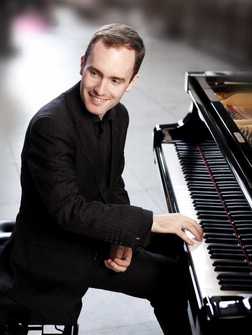
January
Simon Callaghan (piano)
The Funtington Music Group’s opening lecture recital of 2018 was a tour de force presented by Simon Callaghan, the internationally acclaimed pianist. His presentation was on the life and music of little known Sir William Sterndale Bennett, an English composer who was born in 1816, whose compositions are unfortunately rarely played, yet are often challenging, and require a virtuoso performance by the musician.
Although largely forgotten today, Simon Callaghan explained that William Bennett was recognised by Schumann and Mendelssohn as an equal, was as well-known in Germany as he was in England, and at the age of 16 was playing before the King. His early works are recognised as being excellent, and he developed his own style, which is believed to have influenced both Schumann and Mendelssohn, whom he knew well.
Unfortunately Bennett did not develop from his early promise, and, although he continued to compose, his later works are not considered to be in the same class as his early pieces. But he remained at the top of England’s musical elite, with his work at the Royal Academy of Music, ending as Principal in 1865, and Chair of Music at Cambridge University.
Simon Callaghan played recorded extracts from his works to illustrate Bennett’s compositional style and after the interval Simon played in full Bennett’s very demanding Sonata in F Minor Opus 13.
Bennett himself was an amazing pianist, according to all contemporary accounts, and this piece demands incredible concentration, energetic determination, and immaculate virtuosity. Simon Callaghan did not disappoint. This Sonata can sound like a torrent of unrelated chords, but Simon Callaghan infused into this turbulence a grip on the structure that resulted in an exhilarating rendition. He brought rhythmic drive and impetus into his own distinctive interpretation and certainly he demonstrated his own virtuosity with a powerful performance. The audience gave rapturous applause.
David Tinsley, Chairman of Funtington Music Group, said, “What an incredible performer! Simon Callaghan brought to life a piece which most of us will not have heard before, with his own distinctive passion, and with a memorable energy and skill. We are so pleased that he has returned to the Funtington Music Group.”

